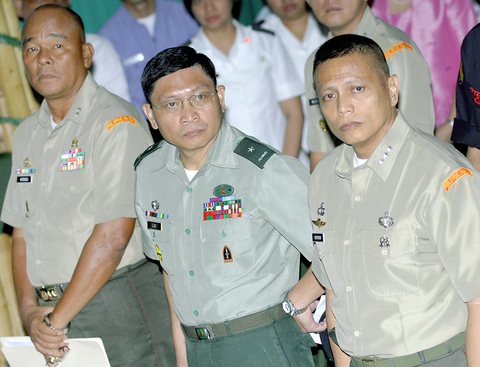More than two dozen Philippine military officers went on trial yesterday for allegedly plotting a coup against President Gloria Macapagal Arroyo earlier this year.
Former Marine commandant Major General Renato Miranda and Army Scout Ranger chief Brigadier General Danilo Lim were among nearly 30 officers who could face the death penalty if convicted of involvement in the alleged February plot.
The officers were handcuffed as they were brought into an army courtroom at a camp east of Manila amid tight security.

PHOTO: AFP
The proceedings began with military prosecutors dropping the charges against two of the accused, citing a lack of evidence.
Lieutenant colonels Romulo Gualdrapa and Valentino Hizon were freed and reinstated in the Marines, prosecutors said.
Defense counsels then quickly moved to reset the arraignment of the other officers, saying they needed more time to consult with their clients. The court granted the request and moved the date to Jan. 11.
Nine Marine officers including Miranda and Colonel Ariel Querubin were to be arraigned in court later in the day, along with 19 Army officers led by Scout Ranger chief Lim.
The alleged plot was to have been carried out with communist rebels and other anti-Arroyo groups on the 20th anniversary of the fall of former dictator Ferdinand Marcos on Feb. 24.
However, prosecutor Colonel Pedro Herrera-Davila said that "there is no prima facie case" against Hizon and Gualdrapa.
The decision to drop charges against the two were based on the directive of Armed Forces chief General Hermogenes Esperon, Davila said.
Arroyo's popularity has taken a beating over allegations of vote fraud in 2004. She had apologized for calling an elections officer but denied trying to influence the vote.
She has beaten back two impeachment attempts in Congress in as many years.

‘SHORTSIGHTED’: Using aid as leverage is punitive, would not be regarded well among Pacific Island nations and would further open the door for China, an academic said New Zealand has suspended millions of dollars in budget funding to the Cook Islands, it said yesterday, as the relationship between the two constitutionally linked countries continues to deteriorate amid the island group’s deepening ties with China. A spokesperson for New Zealand Minister of Foreign Affairs Winston Peters said in a statement that New Zealand early this month decided to suspend payment of NZ$18.2 million (US$11 million) in core sector support funding for this year and next year as it “relies on a high trust bilateral relationship.” New Zealand and Australia have become increasingly cautious about China’s growing presence in the Pacific

The team behind the long-awaited Vera Rubin Observatory in Chile yesterday published their first images, revealing breathtaking views of star-forming regions as well as distant galaxies. More than two decades in the making, the giant US-funded telescope sits perched at the summit of Cerro Pachon in central Chile, where dark skies and dry air provide ideal conditions for observing the cosmos. One of the debut images is a composite of 678 exposures taken over just seven hours, capturing the Trifid Nebula and the Lagoon Nebula — both several thousand light-years from Earth — glowing in vivid pinks against orange-red backdrops. The new image

ESPIONAGE: The British government’s decision on the proposed embassy hinges on the security of underground data cables, a former diplomat has said A US intervention over China’s proposed new embassy in London has thrown a potential resolution “up in the air,” campaigners have said, amid concerns over the site’s proximity to a sensitive hub of critical communication cables. The furor over a new “super-embassy” on the edge of London’s financial district was reignited last week when the White House said it was “deeply concerned” over potential Chinese access to “the sensitive communications of one of our closest allies.” The Dutch parliament has also raised concerns about Beijing’s ideal location of Royal Mint Court, on the edge of the City of London, which has so

Canada and the EU on Monday signed a defense and security pact as the transatlantic partners seek to better confront Russia, with worries over Washington’s reliability under US President Donald Trump. The deal was announced after a summit in Brussels between Canadian Prime Minister Mark Carney and European Commission President Ursula von der Leyen and European Council President Antonio Costa. “While NATO remains the cornerstone of our collective defense, this partnership will allow us to strengthen our preparedness ... to invest more and to invest smarter,” Costa told a news conference. “It opens new opportunities for companies on both sides of the